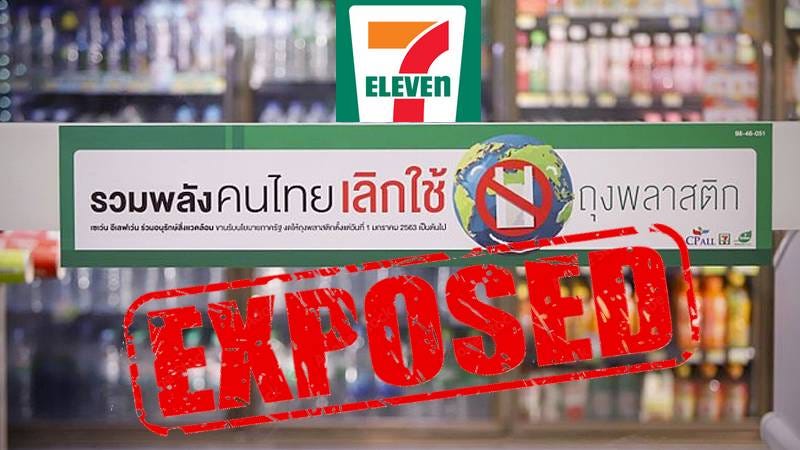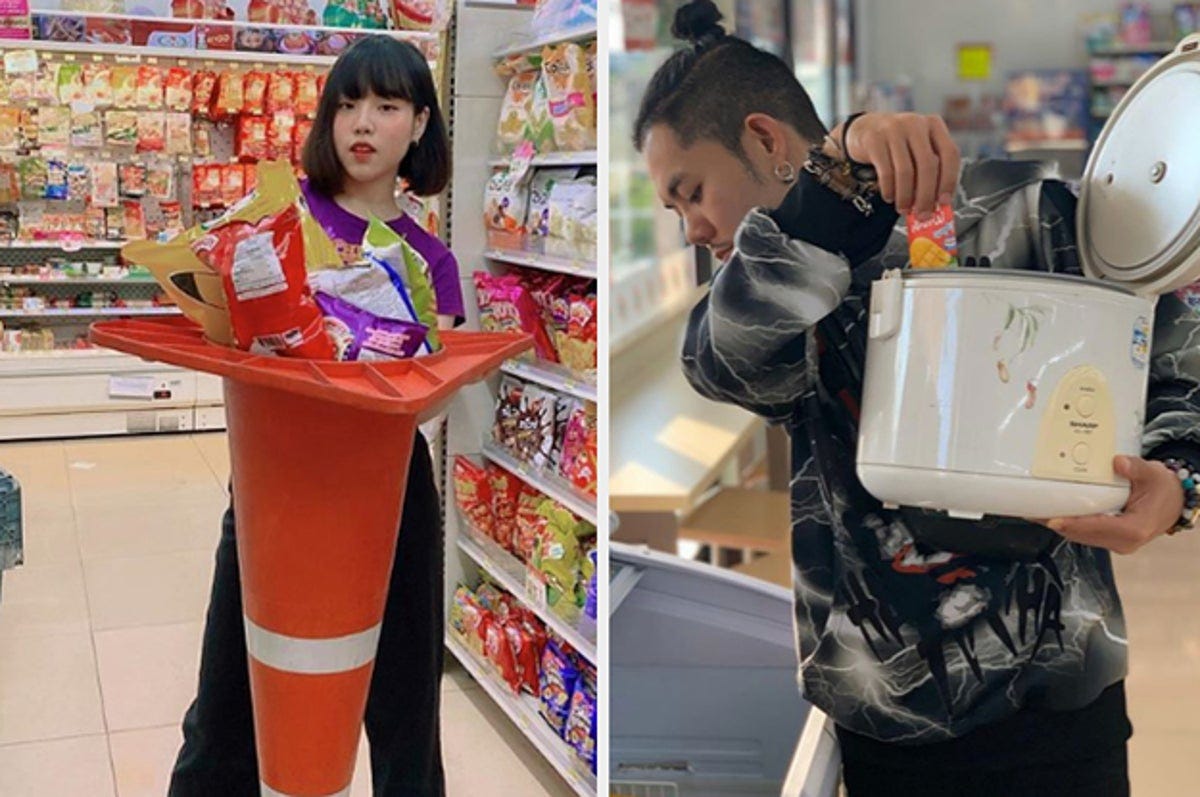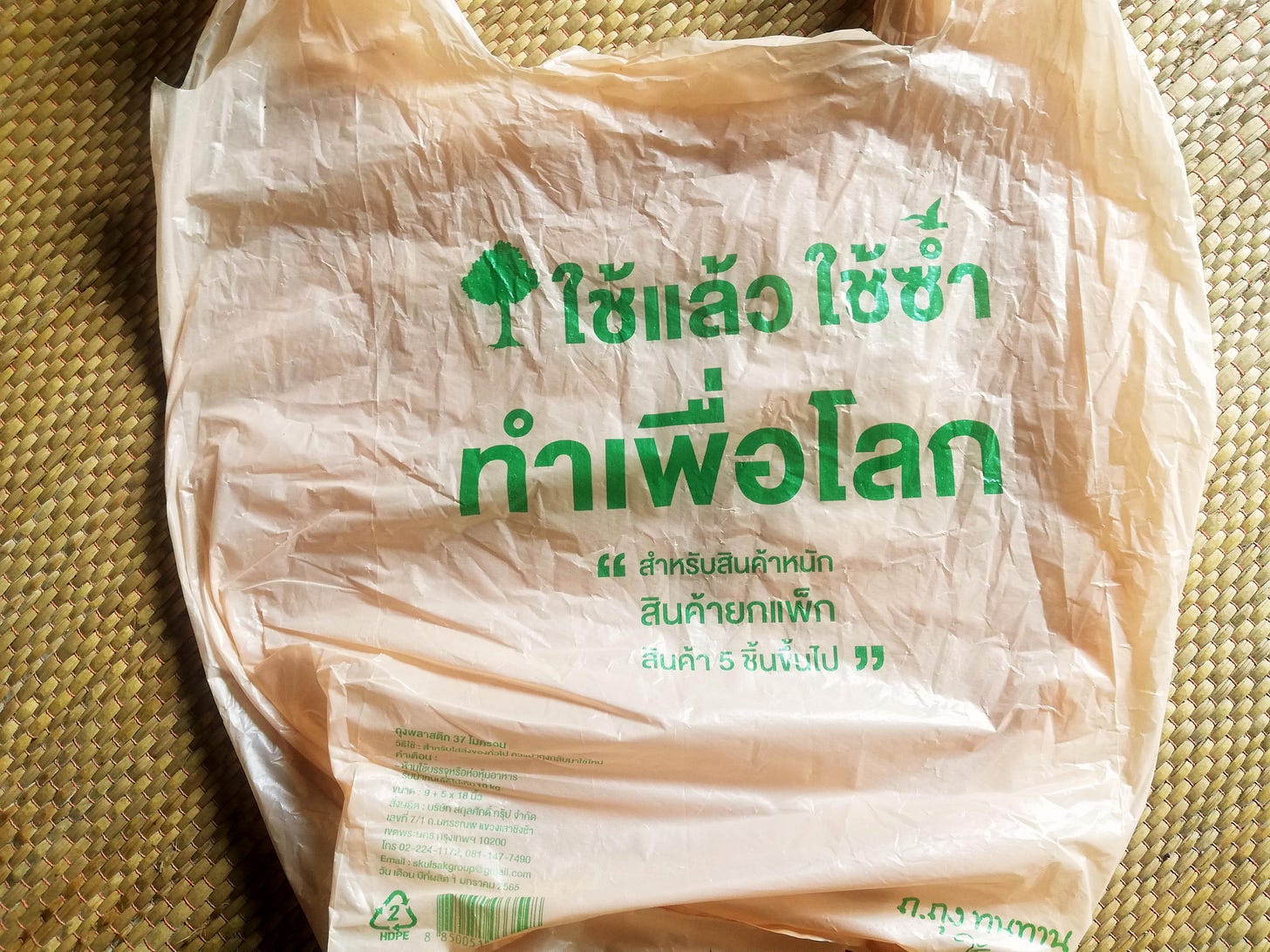7-Eleven’s short-lived flirt with environmentalism
A follow-up on the retailer’s widely-praised 2020 plastic bag ban reveals greenwashing at its best --- [Estimated reading time: 5 min.]

Note: This particular instance of corporate greenwashing has annoyed me for quite a while now, especially because only the initial “ban” was publicized widely and any follow-up would have revealed it for the scam it is. While diverting a bit from my usual range of topics, I strongly felt like someone has to point this out.
Upbeat news were being shared around the world at the beginning of 2020: Thailand’s convenience stores and retailers, 7-Eleven being the most famous one, had banned the distribution of single-use plastic bags! Finally, some positive news in the steadily advancing mudslide of disasters and crises descending upon us hapless late-stage-capitalist consumer slaves!
7-Eleven Thailand gained notoriety among tourists due to lightning-fast store clerks cramming your single can of Chang beer into a plastic bag and adding a plastic straw wrapped in even more plastic, all before you could even open your mouth to say “no bag, please”, and their “do-you-want-a-plastic-bag-with-your-plastic-bag” policy (the practice of stuffing bought items into not one, but two plastic bags, just in case the first plastic bag should rip apart under the immense weight of Lay’s potato chips bags and bars of Oreo cookies). In spite of the heroic service efforts of their employees, the company got tired of the bad press about highways strewn with trash sporting their logo, and 7-Eleven merch clogging waterways and bobbing like sad plastic jellyfish imitations in the waters around the once-picturesque beaches of Thailand.
Greenpeace reported that about 75 billion plastic bags end up in the trash can each year in Thailand (over 1,000 pieces per capita per annum!), with about half of them originating from malls, supermarkets and convenience stores (the other half are supposedly handed out in traditional markets and by street vendors). While I instinctively assume that the total plastic waste caused by malls, supermarkets and convenience stores is a lot higher than 50% of total waste when compared with markets and vendors (especially considering the massive amounts of plastic waste accumulating along the supply chain before items even reach the store shelves, and the packaging of products itself), I acknowledge that it’s well-nigh impossible to make any realistic estimates due to the sheer amount of trash involved and its ubiquity.
Nonetheless easily one of the most vehement contributers to littering, 7-Eleven opens on average two new franchises per day in the Kingdom (Thailand has the highest number of 7-Eleven’s after Japan), and if you’ve ever been to one you know what their business model is: selling poison and pollution. You’ll be hard-pressed to find a product that doesn’t contain copious amounts of refined sugar, or a whole panoply of suspicious food additives with unassuming names like INS251 or INS951 (both of which cause cancer and a host of other diseases), or both.
With much fanfare, CP ALL Plc. (the owner of 7-Eleven franchises in Thailand, with an estimated revenue of 480 billion Baht per year) unironically announced that they would stop handing out single-use plastic bags in 2018 (!), despite operating stores where not a single item can be found that’s not wrapped in plastic at least once.
Two years (!!) later, on January 1st, 2020 AD, Bill McKibben’s wet dream finally came true: accompanied by a massive PR campaign in Thai media outlets disguised as educational material promoting environmental awareness (and touting the companies implementing the “ban” as environmental heroes who only care about fish in the oceans and birds in the sky), 7-Eleven and a total of 42 other retailers banned single-use plastic bags. So far, so good.

In the first few weeks after the ban, customers were surprisingly creative about storing their groceries, but soon enough, annoyance became the new attitude. You can’t force people into adapting environmentally conscious behavior if they value personal convenience higher than the health of the environment they inhabit. As a result, plastic bags were handed out to customers “upon request”, for “purchases greater than five items”, or if you just looked like you didn’t bring a bag. As little as three months after the “ban”, the Bangkok Post reported that 7-Eleven stores throughout the metropolitan region were still handing out plastic bags:
“Retailers are able to skirt the ban because the measure never actually had enforcement mechanisms. No law or regulation was enacted, only an agreement between the government and 75 major corporate retailers to stop using single-use plastic bags as part of the government’s plastic waste management roadmap.
But now some retailers are treating the policy as more of a suggestion.
As the ban was not codified into law, retailers were left to set their own plastic policies. For instance, 7-Eleven continued to use plastic bags for hot food items initially, drawing no criticism as it appeared a necessary safety precaution.” [Emphasis mine]
Two more years later, 7-Eleven has quietly returned to what they’re best at: handing out innumerable pieces of trash each day to indifferent consumers who still value “convenience” over the seemingly unsurmountable effort to remember bringing a basket or a bag.
They’ve added a twist though: bolstered by the unassailable argument that charging customers money for the bag will swiftly deter anyone from wanting to use them, plastic bags now cost one Thai Baht (0.027 USD!) – a price that is sure to make shoppers wail in agony at the horrendous amount of additional expenses and vehemently deny using any plastic bags with a disgusted expression on their faces as a result of this (green) skulduggery. Well, that’s according to 7-Eleven’s logic. In reality, people couldn’t care less. One Baht more on their grocery bill is such a miniscule inconvenience that most people don’t even realize they’ve been charged extra, and it even took me a few times to realize this scam* because store clerks don’t even ask if you want a bag anymore. Back to normal, indeed.
This clever marketing strategy is a textbook example of killing two birds with one stone: you shift any environmental responsibility onto the customer, and now even have an additional source of income from products previously provided for free (and thus at a net loss)! With over 11 million daily customers, that’s a whole lot of plastic bags – and a whole lot of additional income: if everyone “buys” one plastic bag, that’s an additional 11 million Baht for CP ALL Plc every day. Of course, industry spokespersons assure us, the additional profits go straight into “environmental causes” – presumably to buy more “environmental awareness” advertising to further greenwash their businesses and deceive consumers.
The new bags handed out in 7-Eleven stores throughout the country are not even made from “biodegradable” “bio”-plastics (that, as a new study shows, are just as toxic as regular plastic), but consist of good old High Density Polyethylene (HDPE). Same shit, new wrapping.
But it gets even better: Now their plastic bags come not only in an eco-friendly-looking earthy adobe color (instead of the previously used white), but feature an inspirational “green” slogan (in green letters, of course), saying “If you’ve used it, use it again! Do it for the Earth!”, and – David Attenborough wipes away a tear – they have a tree and a bird printed onto them!! Now, this must be good for the environment! Rest assured, citizens of Thailand, 7-Eleven still loves Nature!
(And presumably plastic bags scattered among roads and beaches are now camouflaged a bit better.)
The whole story (and the way it was reported) is reminiscent of misleading online “product reviews” that actually say very little about the product itself (considering that most consumer goods are not intended to be single-use): they feature items that were bought that very same day, and – surprise, surprise! – work perfectly well, just as advertised by the company that produced them. Of course your new laptop is going to work just fine the first time you turn it on, and of course it boots in a few seconds and the battery lasts the promised 12 hours! But how do those claims hold up after a few years of constant use?
The really interesting reviews would be set, for instance, five years after the initial purchase**, to include any potential planned obsolescence. How long does your laptop battery last now?
Likewise, it makes sense to review 7-Eleven’s altruistic act of environmental kindness a few years later: alas, after a mere two years, their care for the environment seems to be utterly exhausted already.
Technically (or better, legally), they’re still adhering to their self-imposed policy: the new plastic bags cannot be considered “single-use” anymore, since customers are explicitly encouraged to use them again! Pretty much the same as recycling, right? Follow 7-Eleven’s righteous example and GO GREEN!
(Whatever that’s even supposed to mean…)
* Yes, I shop at 7-Eleven as well, thank you for bringing up the old tu quoque fallacy. The only items I buy there are toothpaste and soap, because the local store down in the village only has Colgate and Unilever products. Regrettably, the all-natural local brands we prefer to use are only available at 7-Eleven in our subdistrict (arguably the only useful things to buy there anyway).
** If I could muster the motivation to spend more time in front of a computer screen, I would build a web forum that exclusively publishes long-term reviews intended to expose planned obsolescence and help conscious consumers to avoid buying stuff that needs to be re-bought every few years. If any such forum exists, please let me know in the comments.





